English Legal Systems and Skills: Case and Statute Analysis Homework
VerifiedAdded on 2020/01/23
|13
|3213
|86
Homework Assignment
AI Summary
This assignment delves into the English Legal System, focusing on case and statute analysis. Part 1 examines the landmark case of Gillick v West Norfolk, exploring issues of parental rights, a minor's right to consent to medical treatment (specifically contraception), and the concept of 'Gillick competency.' The analysis includes key judgments, arguments, and the implications of the ruling, including the test of 'Gillick competency' and its practical challenges. Part 2 shifts to statute analysis, specifically addressing the Corporate Manslaughter and Corporate Homicide Act 2007, examining the criteria for corporate criminal liability, the definition of 'senior management,' and the application of legal interpretation rules such as ejusdem generis. The assignment provides detailed answers to specific questions, offering a comprehensive understanding of the legal principles and their application within the English legal framework. The document showcases the application of legal concepts and judicial reasoning, crucial for law students studying English Legal Systems and Skills.
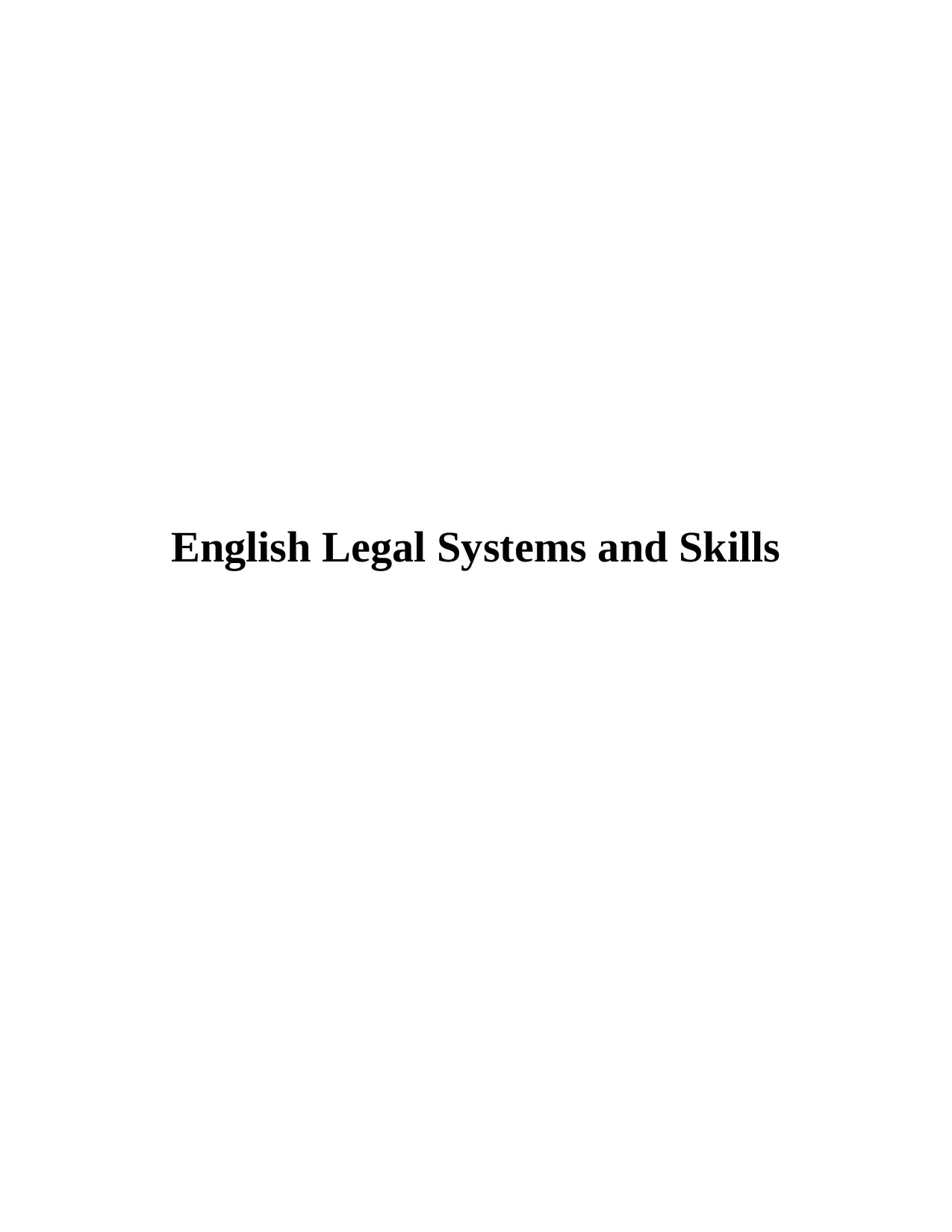
English Legal Systems and Skills
Paraphrase This Document
Need a fresh take? Get an instant paraphrase of this document with our AI Paraphraser
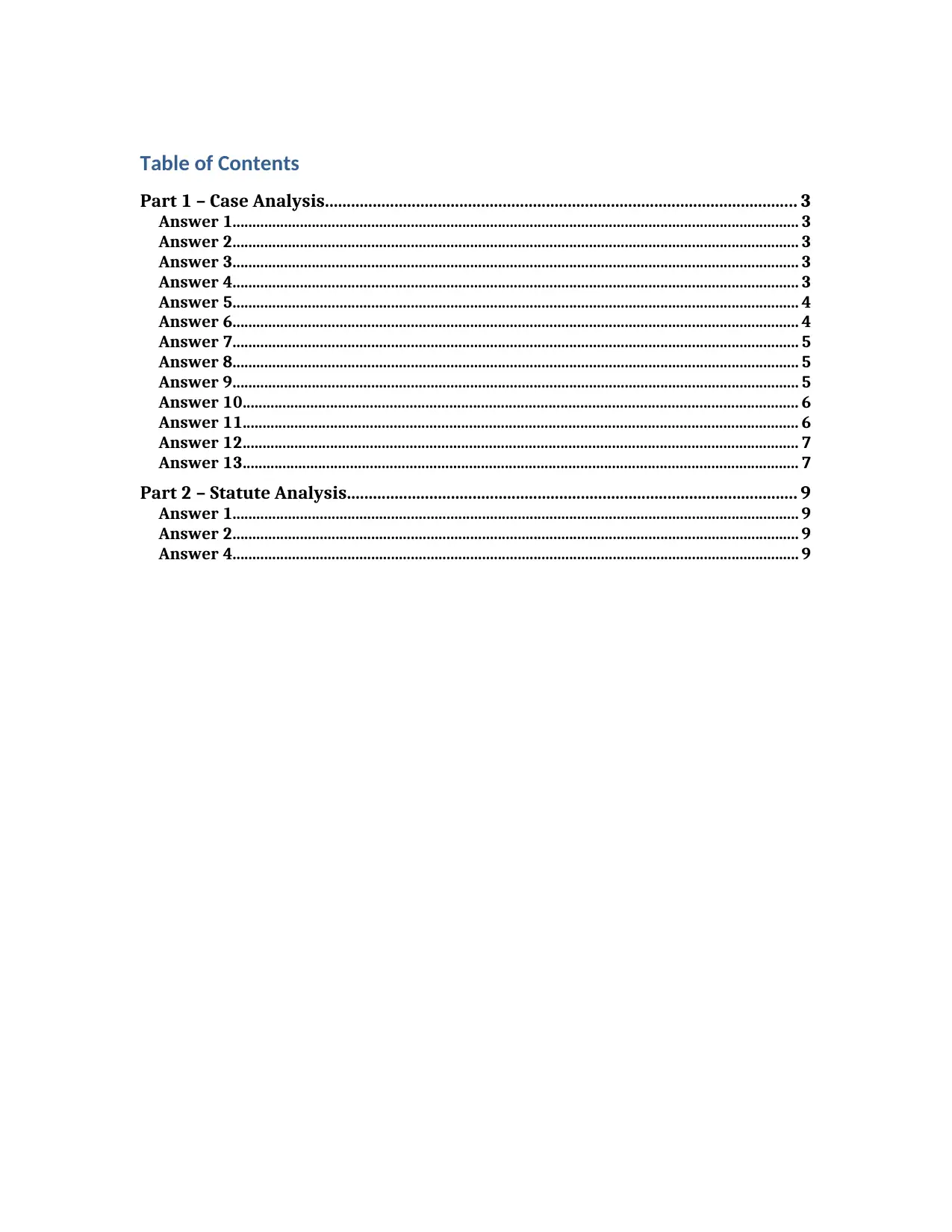
Table of Contents
Part 1 – Case Analysis............................................................................................................. 3
Answer 1............................................................................................................................................... 3
Answer 2............................................................................................................................................... 3
Answer 3............................................................................................................................................... 3
Answer 4............................................................................................................................................... 3
Answer 5............................................................................................................................................... 4
Answer 6............................................................................................................................................... 4
Answer 7............................................................................................................................................... 5
Answer 8............................................................................................................................................... 5
Answer 9............................................................................................................................................... 5
Answer 10............................................................................................................................................ 6
Answer 11............................................................................................................................................ 6
Answer 12............................................................................................................................................ 7
Answer 13............................................................................................................................................ 7
Part 2 – Statute Analysis........................................................................................................ 9
Answer 1............................................................................................................................................... 9
Answer 2............................................................................................................................................... 9
Answer 4............................................................................................................................................... 9
Part 1 – Case Analysis............................................................................................................. 3
Answer 1............................................................................................................................................... 3
Answer 2............................................................................................................................................... 3
Answer 3............................................................................................................................................... 3
Answer 4............................................................................................................................................... 3
Answer 5............................................................................................................................................... 4
Answer 6............................................................................................................................................... 4
Answer 7............................................................................................................................................... 5
Answer 8............................................................................................................................................... 5
Answer 9............................................................................................................................................... 5
Answer 10............................................................................................................................................ 6
Answer 11............................................................................................................................................ 6
Answer 12............................................................................................................................................ 7
Answer 13............................................................................................................................................ 7
Part 2 – Statute Analysis........................................................................................................ 9
Answer 1............................................................................................................................................... 9
Answer 2............................................................................................................................................... 9
Answer 4............................................................................................................................................... 9
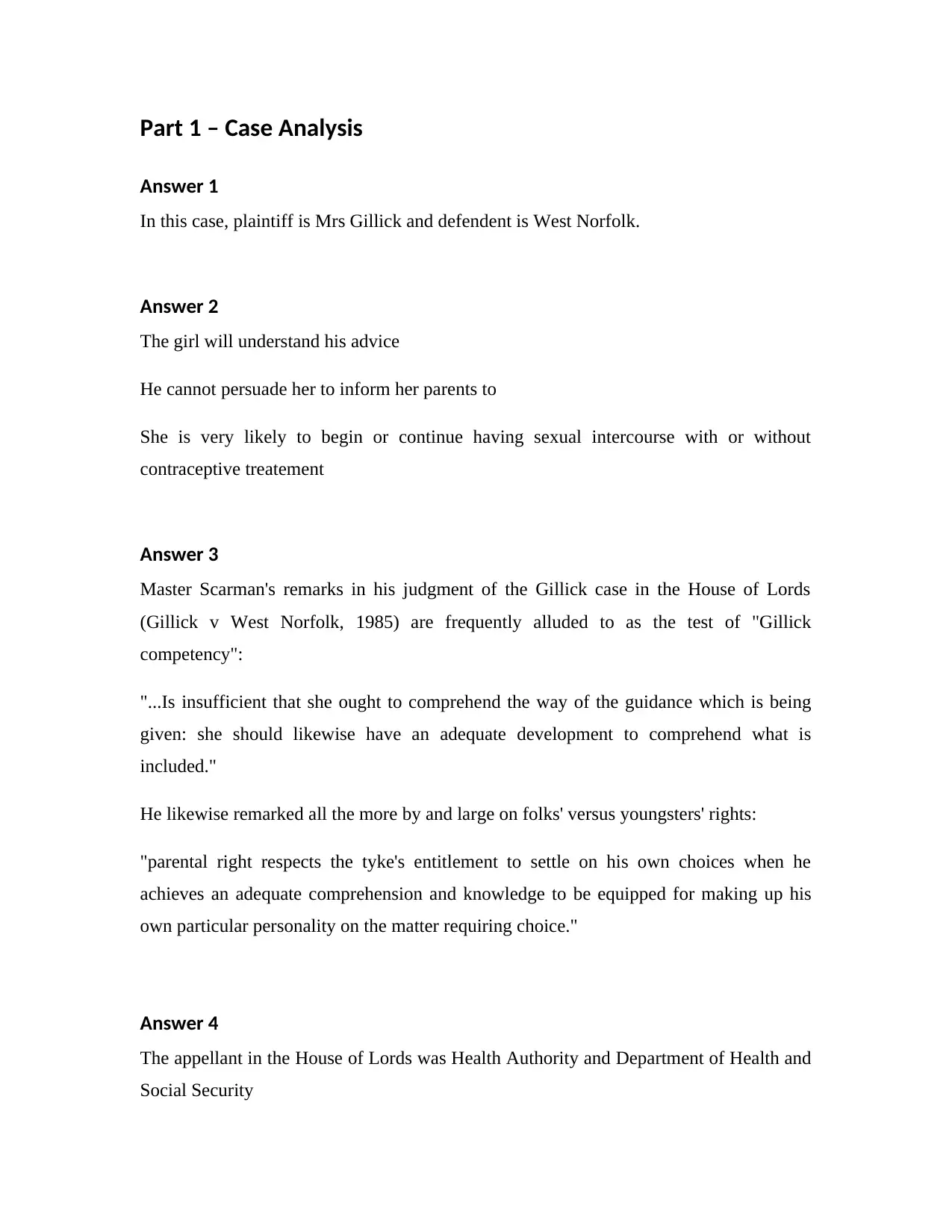
Part 1 – Case Analysis
Answer 1
In this case, plaintiff is Mrs Gillick and defendent is West Norfolk.
Answer 2
The girl will understand his advice
He cannot persuade her to inform her parents to
She is very likely to begin or continue having sexual intercourse with or without
contraceptive treatement
Answer 3
Master Scarman's remarks in his judgment of the Gillick case in the House of Lords
(Gillick v West Norfolk, 1985) are frequently alluded to as the test of "Gillick
competency":
"...Is insufficient that she ought to comprehend the way of the guidance which is being
given: she should likewise have an adequate development to comprehend what is
included."
He likewise remarked all the more by and large on folks' versus youngsters' rights:
"parental right respects the tyke's entitlement to settle on his own choices when he
achieves an adequate comprehension and knowledge to be equipped for making up his
own particular personality on the matter requiring choice."
Answer 4
The appellant in the House of Lords was Health Authority and Department of Health and
Social Security
Answer 1
In this case, plaintiff is Mrs Gillick and defendent is West Norfolk.
Answer 2
The girl will understand his advice
He cannot persuade her to inform her parents to
She is very likely to begin or continue having sexual intercourse with or without
contraceptive treatement
Answer 3
Master Scarman's remarks in his judgment of the Gillick case in the House of Lords
(Gillick v West Norfolk, 1985) are frequently alluded to as the test of "Gillick
competency":
"...Is insufficient that she ought to comprehend the way of the guidance which is being
given: she should likewise have an adequate development to comprehend what is
included."
He likewise remarked all the more by and large on folks' versus youngsters' rights:
"parental right respects the tyke's entitlement to settle on his own choices when he
achieves an adequate comprehension and knowledge to be equipped for making up his
own particular personality on the matter requiring choice."
Answer 4
The appellant in the House of Lords was Health Authority and Department of Health and
Social Security
⊘ This is a preview!⊘
Do you want full access?
Subscribe today to unlock all pages.

Trusted by 1+ million students worldwide
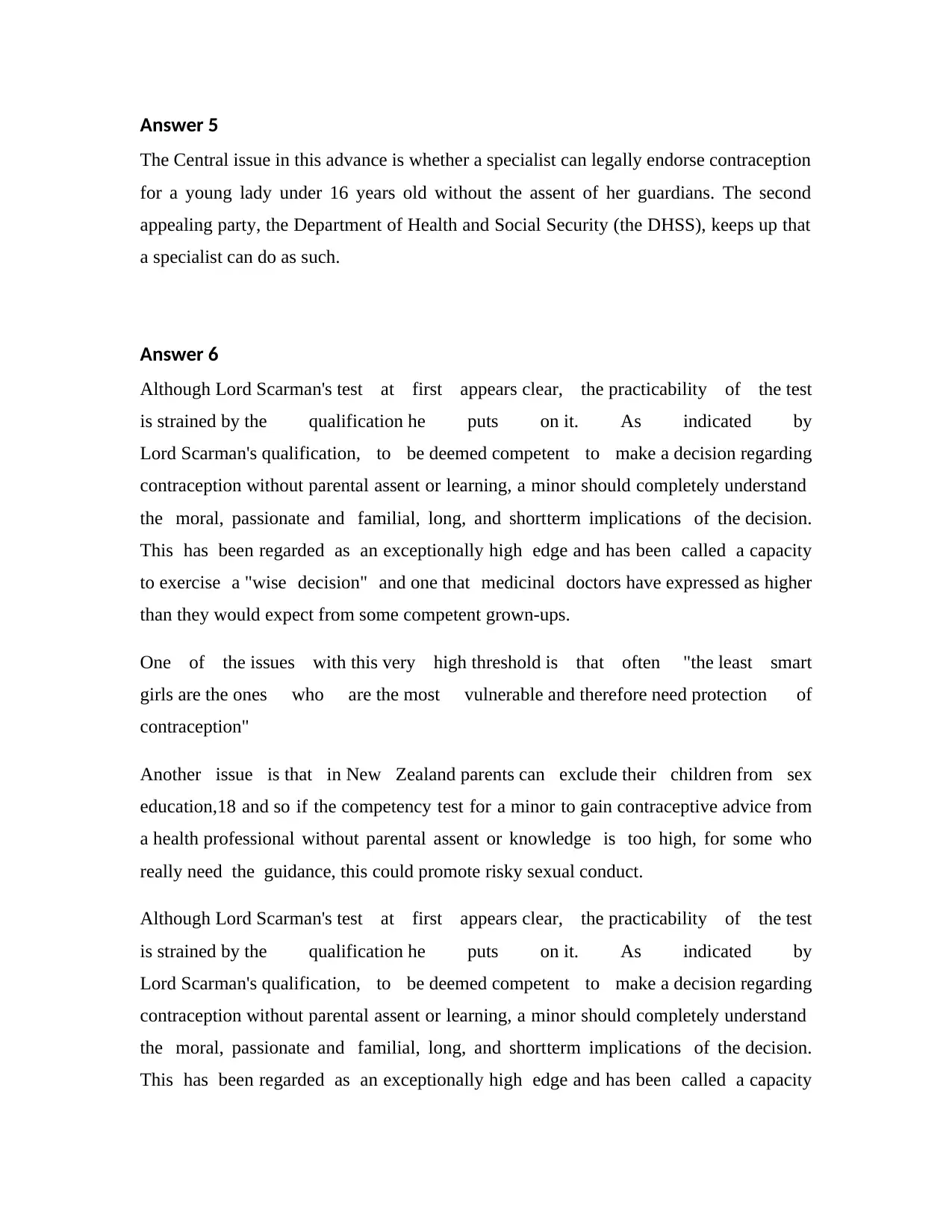
Answer 5
The Central issue in this advance is whether a specialist can legally endorse contraception
for a young lady under 16 years old without the assent of her guardians. The second
appealing party, the Department of Health and Social Security (the DHSS), keeps up that
a specialist can do as such.
Answer 6
Although Lord Scarman's test at first appears clear, the practicability of the test
is strained by the qualification he puts on it. As indicated by
Lord Scarman's qualification, to be deemed competent to make a decision regarding
contraception without parental assent or learning, a minor should completely understand
the moral, passionate and familial, long, and shortterm implications of the decision.
This has been regarded as an exceptionally high edge and has been called a capacity
to exercise a "wise decision" and one that medicinal doctors have expressed as higher
than they would expect from some competent grown-ups.
One of the issues with this very high threshold is that often "the least smart
girls are the ones who are the most vulnerable and therefore need protection of
contraception"
Another issue is that in New Zealand parents can exclude their children from sex
education,18 and so if the competency test for a minor to gain contraceptive advice from
a health professional without parental assent or knowledge is too high, for some who
really need the guidance, this could promote risky sexual conduct.
Although Lord Scarman's test at first appears clear, the practicability of the test
is strained by the qualification he puts on it. As indicated by
Lord Scarman's qualification, to be deemed competent to make a decision regarding
contraception without parental assent or learning, a minor should completely understand
the moral, passionate and familial, long, and shortterm implications of the decision.
This has been regarded as an exceptionally high edge and has been called a capacity
The Central issue in this advance is whether a specialist can legally endorse contraception
for a young lady under 16 years old without the assent of her guardians. The second
appealing party, the Department of Health and Social Security (the DHSS), keeps up that
a specialist can do as such.
Answer 6
Although Lord Scarman's test at first appears clear, the practicability of the test
is strained by the qualification he puts on it. As indicated by
Lord Scarman's qualification, to be deemed competent to make a decision regarding
contraception without parental assent or learning, a minor should completely understand
the moral, passionate and familial, long, and shortterm implications of the decision.
This has been regarded as an exceptionally high edge and has been called a capacity
to exercise a "wise decision" and one that medicinal doctors have expressed as higher
than they would expect from some competent grown-ups.
One of the issues with this very high threshold is that often "the least smart
girls are the ones who are the most vulnerable and therefore need protection of
contraception"
Another issue is that in New Zealand parents can exclude their children from sex
education,18 and so if the competency test for a minor to gain contraceptive advice from
a health professional without parental assent or knowledge is too high, for some who
really need the guidance, this could promote risky sexual conduct.
Although Lord Scarman's test at first appears clear, the practicability of the test
is strained by the qualification he puts on it. As indicated by
Lord Scarman's qualification, to be deemed competent to make a decision regarding
contraception without parental assent or learning, a minor should completely understand
the moral, passionate and familial, long, and shortterm implications of the decision.
This has been regarded as an exceptionally high edge and has been called a capacity
Paraphrase This Document
Need a fresh take? Get an instant paraphrase of this document with our AI Paraphraser
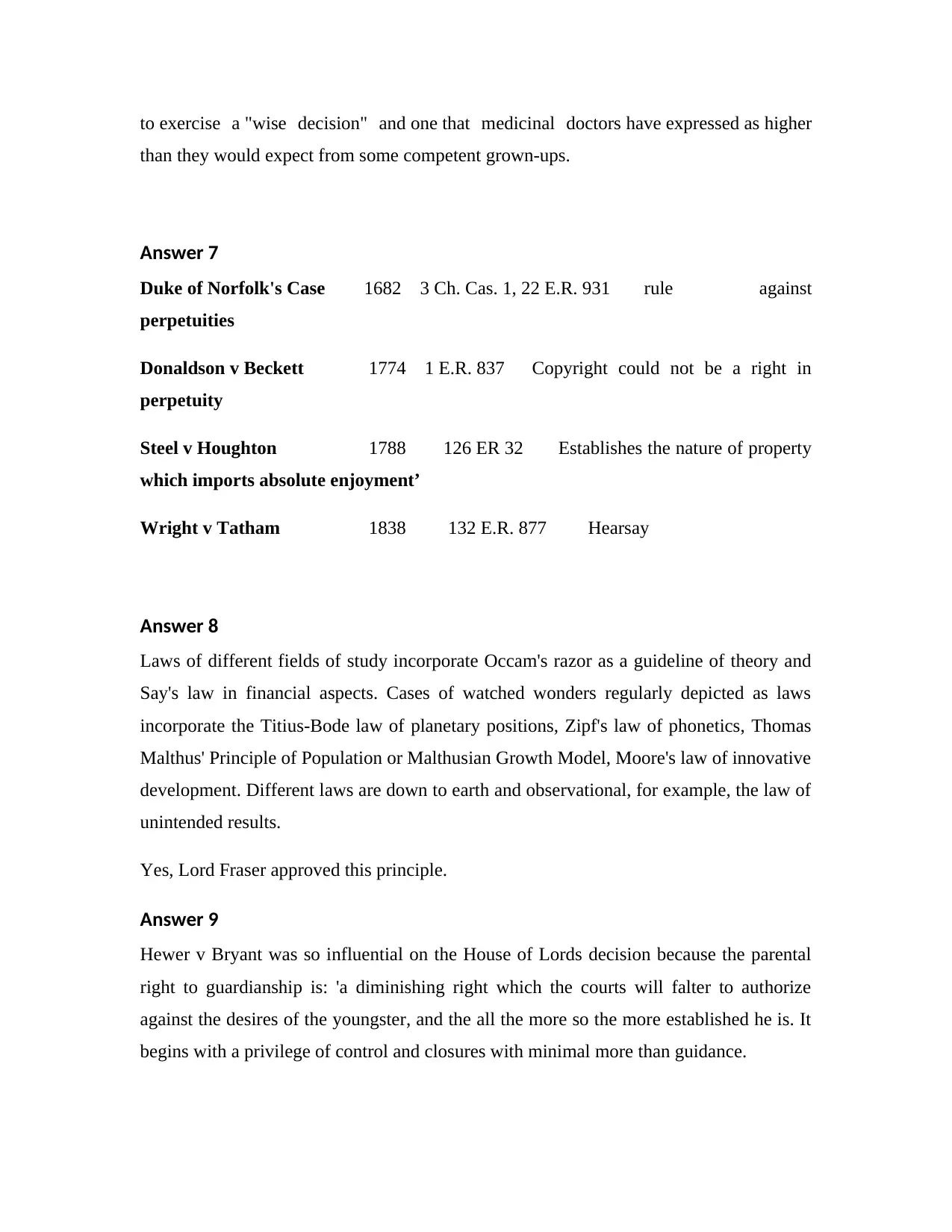
to exercise a "wise decision" and one that medicinal doctors have expressed as higher
than they would expect from some competent grown-ups.
Answer 7
Duke of Norfolk's Case 1682 3 Ch. Cas. 1, 22 E.R. 931 rule against
perpetuities
Donaldson v Beckett 1774 1 E.R. 837 Copyright could not be a right in
perpetuity
Steel v Houghton 1788 126 ER 32 Establishes the nature of property
which imports absolute enjoyment’
Wright v Tatham 1838 132 E.R. 877 Hearsay
Answer 8
Laws of different fields of study incorporate Occam's razor as a guideline of theory and
Say's law in financial aspects. Cases of watched wonders regularly depicted as laws
incorporate the Titius-Bode law of planetary positions, Zipf's law of phonetics, Thomas
Malthus' Principle of Population or Malthusian Growth Model, Moore's law of innovative
development. Different laws are down to earth and observational, for example, the law of
unintended results.
Yes, Lord Fraser approved this principle.
Answer 9
Hewer v Bryant was so influential on the House of Lords decision because the parental
right to guardianship is: 'a diminishing right which the courts will falter to authorize
against the desires of the youngster, and the all the more so the more established he is. It
begins with a privilege of control and closures with minimal more than guidance.
than they would expect from some competent grown-ups.
Answer 7
Duke of Norfolk's Case 1682 3 Ch. Cas. 1, 22 E.R. 931 rule against
perpetuities
Donaldson v Beckett 1774 1 E.R. 837 Copyright could not be a right in
perpetuity
Steel v Houghton 1788 126 ER 32 Establishes the nature of property
which imports absolute enjoyment’
Wright v Tatham 1838 132 E.R. 877 Hearsay
Answer 8
Laws of different fields of study incorporate Occam's razor as a guideline of theory and
Say's law in financial aspects. Cases of watched wonders regularly depicted as laws
incorporate the Titius-Bode law of planetary positions, Zipf's law of phonetics, Thomas
Malthus' Principle of Population or Malthusian Growth Model, Moore's law of innovative
development. Different laws are down to earth and observational, for example, the law of
unintended results.
Yes, Lord Fraser approved this principle.
Answer 9
Hewer v Bryant was so influential on the House of Lords decision because the parental
right to guardianship is: 'a diminishing right which the courts will falter to authorize
against the desires of the youngster, and the all the more so the more established he is. It
begins with a privilege of control and closures with minimal more than guidance.
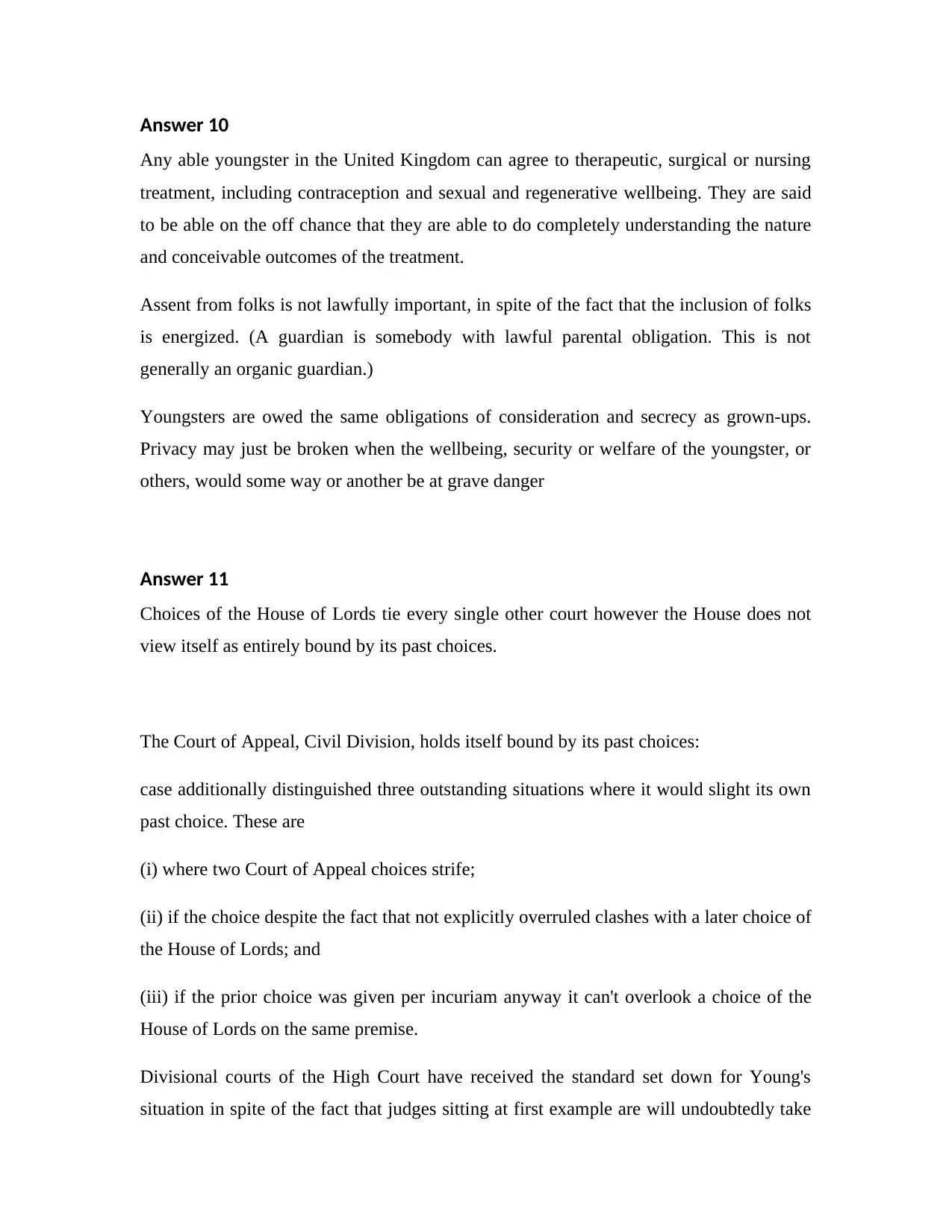
Answer 10
Any able youngster in the United Kingdom can agree to therapeutic, surgical or nursing
treatment, including contraception and sexual and regenerative wellbeing. They are said
to be able on the off chance that they are able to do completely understanding the nature
and conceivable outcomes of the treatment.
Assent from folks is not lawfully important, in spite of the fact that the inclusion of folks
is energized. (A guardian is somebody with lawful parental obligation. This is not
generally an organic guardian.)
Youngsters are owed the same obligations of consideration and secrecy as grown-ups.
Privacy may just be broken when the wellbeing, security or welfare of the youngster, or
others, would some way or another be at grave danger
Answer 11
Choices of the House of Lords tie every single other court however the House does not
view itself as entirely bound by its past choices.
The Court of Appeal, Civil Division, holds itself bound by its past choices:
case additionally distinguished three outstanding situations where it would slight its own
past choice. These are
(i) where two Court of Appeal choices strife;
(ii) if the choice despite the fact that not explicitly overruled clashes with a later choice of
the House of Lords; and
(iii) if the prior choice was given per incuriam anyway it can't overlook a choice of the
House of Lords on the same premise.
Divisional courts of the High Court have received the standard set down for Young's
situation in spite of the fact that judges sitting at first example are will undoubtedly take
Any able youngster in the United Kingdom can agree to therapeutic, surgical or nursing
treatment, including contraception and sexual and regenerative wellbeing. They are said
to be able on the off chance that they are able to do completely understanding the nature
and conceivable outcomes of the treatment.
Assent from folks is not lawfully important, in spite of the fact that the inclusion of folks
is energized. (A guardian is somebody with lawful parental obligation. This is not
generally an organic guardian.)
Youngsters are owed the same obligations of consideration and secrecy as grown-ups.
Privacy may just be broken when the wellbeing, security or welfare of the youngster, or
others, would some way or another be at grave danger
Answer 11
Choices of the House of Lords tie every single other court however the House does not
view itself as entirely bound by its past choices.
The Court of Appeal, Civil Division, holds itself bound by its past choices:
case additionally distinguished three outstanding situations where it would slight its own
past choice. These are
(i) where two Court of Appeal choices strife;
(ii) if the choice despite the fact that not explicitly overruled clashes with a later choice of
the House of Lords; and
(iii) if the prior choice was given per incuriam anyway it can't overlook a choice of the
House of Lords on the same premise.
Divisional courts of the High Court have received the standard set down for Young's
situation in spite of the fact that judges sitting at first example are will undoubtedly take
⊘ This is a preview!⊘
Do you want full access?
Subscribe today to unlock all pages.

Trusted by 1+ million students worldwide
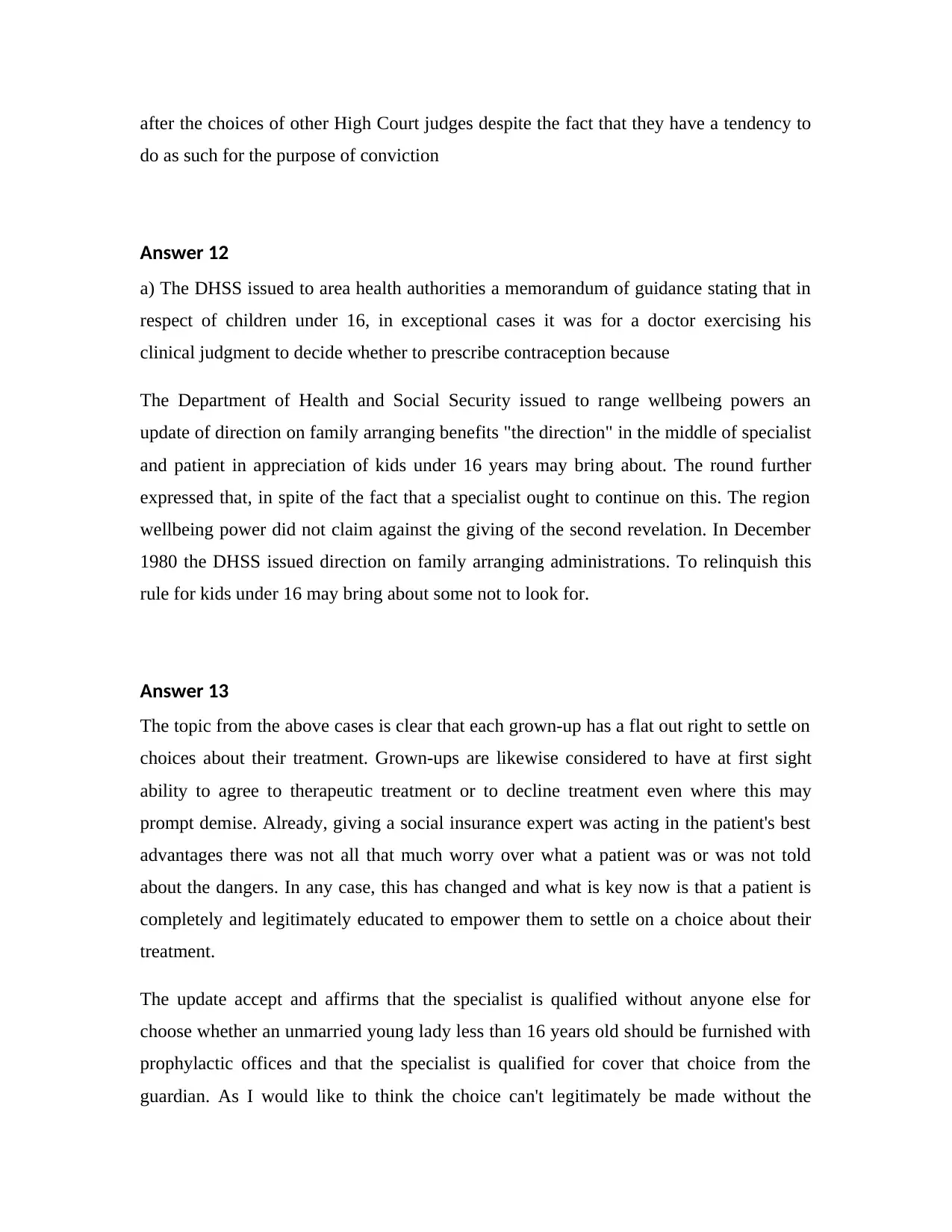
after the choices of other High Court judges despite the fact that they have a tendency to
do as such for the purpose of conviction
Answer 12
a) The DHSS issued to area health authorities a memorandum of guidance stating that in
respect of children under 16, in exceptional cases it was for a doctor exercising his
clinical judgment to decide whether to prescribe contraception because
The Department of Health and Social Security issued to range wellbeing powers an
update of direction on family arranging benefits "the direction" in the middle of specialist
and patient in appreciation of kids under 16 years may bring about. The round further
expressed that, in spite of the fact that a specialist ought to continue on this. The region
wellbeing power did not claim against the giving of the second revelation. In December
1980 the DHSS issued direction on family arranging administrations. To relinquish this
rule for kids under 16 may bring about some not to look for.
Answer 13
The topic from the above cases is clear that each grown-up has a flat out right to settle on
choices about their treatment. Grown-ups are likewise considered to have at first sight
ability to agree to therapeutic treatment or to decline treatment even where this may
prompt demise. Already, giving a social insurance expert was acting in the patient's best
advantages there was not all that much worry over what a patient was or was not told
about the dangers. In any case, this has changed and what is key now is that a patient is
completely and legitimately educated to empower them to settle on a choice about their
treatment.
The update accept and affirms that the specialist is qualified without anyone else for
choose whether an unmarried young lady less than 16 years old should be furnished with
prophylactic offices and that the specialist is qualified for cover that choice from the
guardian. As I would like to think the choice can't legitimately be made without the
do as such for the purpose of conviction
Answer 12
a) The DHSS issued to area health authorities a memorandum of guidance stating that in
respect of children under 16, in exceptional cases it was for a doctor exercising his
clinical judgment to decide whether to prescribe contraception because
The Department of Health and Social Security issued to range wellbeing powers an
update of direction on family arranging benefits "the direction" in the middle of specialist
and patient in appreciation of kids under 16 years may bring about. The round further
expressed that, in spite of the fact that a specialist ought to continue on this. The region
wellbeing power did not claim against the giving of the second revelation. In December
1980 the DHSS issued direction on family arranging administrations. To relinquish this
rule for kids under 16 may bring about some not to look for.
Answer 13
The topic from the above cases is clear that each grown-up has a flat out right to settle on
choices about their treatment. Grown-ups are likewise considered to have at first sight
ability to agree to therapeutic treatment or to decline treatment even where this may
prompt demise. Already, giving a social insurance expert was acting in the patient's best
advantages there was not all that much worry over what a patient was or was not told
about the dangers. In any case, this has changed and what is key now is that a patient is
completely and legitimately educated to empower them to settle on a choice about their
treatment.
The update accept and affirms that the specialist is qualified without anyone else for
choose whether an unmarried young lady less than 16 years old should be furnished with
prophylactic offices and that the specialist is qualified for cover that choice from the
guardian. As I would like to think the choice can't legitimately be made without the
Paraphrase This Document
Need a fresh take? Get an instant paraphrase of this document with our AI Paraphraser
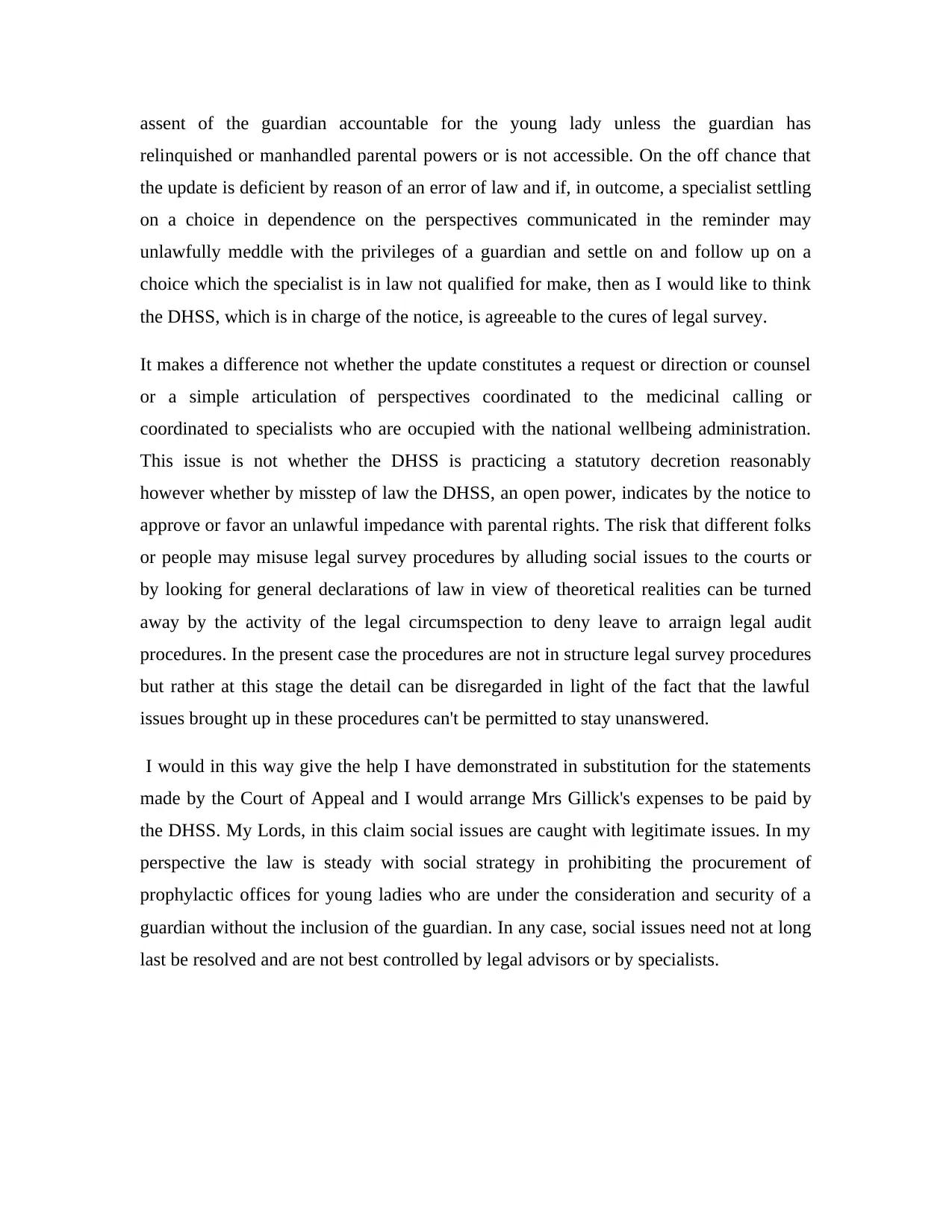
assent of the guardian accountable for the young lady unless the guardian has
relinquished or manhandled parental powers or is not accessible. On the off chance that
the update is deficient by reason of an error of law and if, in outcome, a specialist settling
on a choice in dependence on the perspectives communicated in the reminder may
unlawfully meddle with the privileges of a guardian and settle on and follow up on a
choice which the specialist is in law not qualified for make, then as I would like to think
the DHSS, which is in charge of the notice, is agreeable to the cures of legal survey.
It makes a difference not whether the update constitutes a request or direction or counsel
or a simple articulation of perspectives coordinated to the medicinal calling or
coordinated to specialists who are occupied with the national wellbeing administration.
This issue is not whether the DHSS is practicing a statutory decretion reasonably
however whether by misstep of law the DHSS, an open power, indicates by the notice to
approve or favor an unlawful impedance with parental rights. The risk that different folks
or people may misuse legal survey procedures by alluding social issues to the courts or
by looking for general declarations of law in view of theoretical realities can be turned
away by the activity of the legal circumspection to deny leave to arraign legal audit
procedures. In the present case the procedures are not in structure legal survey procedures
but rather at this stage the detail can be disregarded in light of the fact that the lawful
issues brought up in these procedures can't be permitted to stay unanswered.
I would in this way give the help I have demonstrated in substitution for the statements
made by the Court of Appeal and I would arrange Mrs Gillick's expenses to be paid by
the DHSS. My Lords, in this claim social issues are caught with legitimate issues. In my
perspective the law is steady with social strategy in prohibiting the procurement of
prophylactic offices for young ladies who are under the consideration and security of a
guardian without the inclusion of the guardian. In any case, social issues need not at long
last be resolved and are not best controlled by legal advisors or by specialists.
relinquished or manhandled parental powers or is not accessible. On the off chance that
the update is deficient by reason of an error of law and if, in outcome, a specialist settling
on a choice in dependence on the perspectives communicated in the reminder may
unlawfully meddle with the privileges of a guardian and settle on and follow up on a
choice which the specialist is in law not qualified for make, then as I would like to think
the DHSS, which is in charge of the notice, is agreeable to the cures of legal survey.
It makes a difference not whether the update constitutes a request or direction or counsel
or a simple articulation of perspectives coordinated to the medicinal calling or
coordinated to specialists who are occupied with the national wellbeing administration.
This issue is not whether the DHSS is practicing a statutory decretion reasonably
however whether by misstep of law the DHSS, an open power, indicates by the notice to
approve or favor an unlawful impedance with parental rights. The risk that different folks
or people may misuse legal survey procedures by alluding social issues to the courts or
by looking for general declarations of law in view of theoretical realities can be turned
away by the activity of the legal circumspection to deny leave to arraign legal audit
procedures. In the present case the procedures are not in structure legal survey procedures
but rather at this stage the detail can be disregarded in light of the fact that the lawful
issues brought up in these procedures can't be permitted to stay unanswered.
I would in this way give the help I have demonstrated in substitution for the statements
made by the Court of Appeal and I would arrange Mrs Gillick's expenses to be paid by
the DHSS. My Lords, in this claim social issues are caught with legitimate issues. In my
perspective the law is steady with social strategy in prohibiting the procurement of
prophylactic offices for young ladies who are under the consideration and security of a
guardian without the inclusion of the guardian. In any case, social issues need not at long
last be resolved and are not best controlled by legal advisors or by specialists.
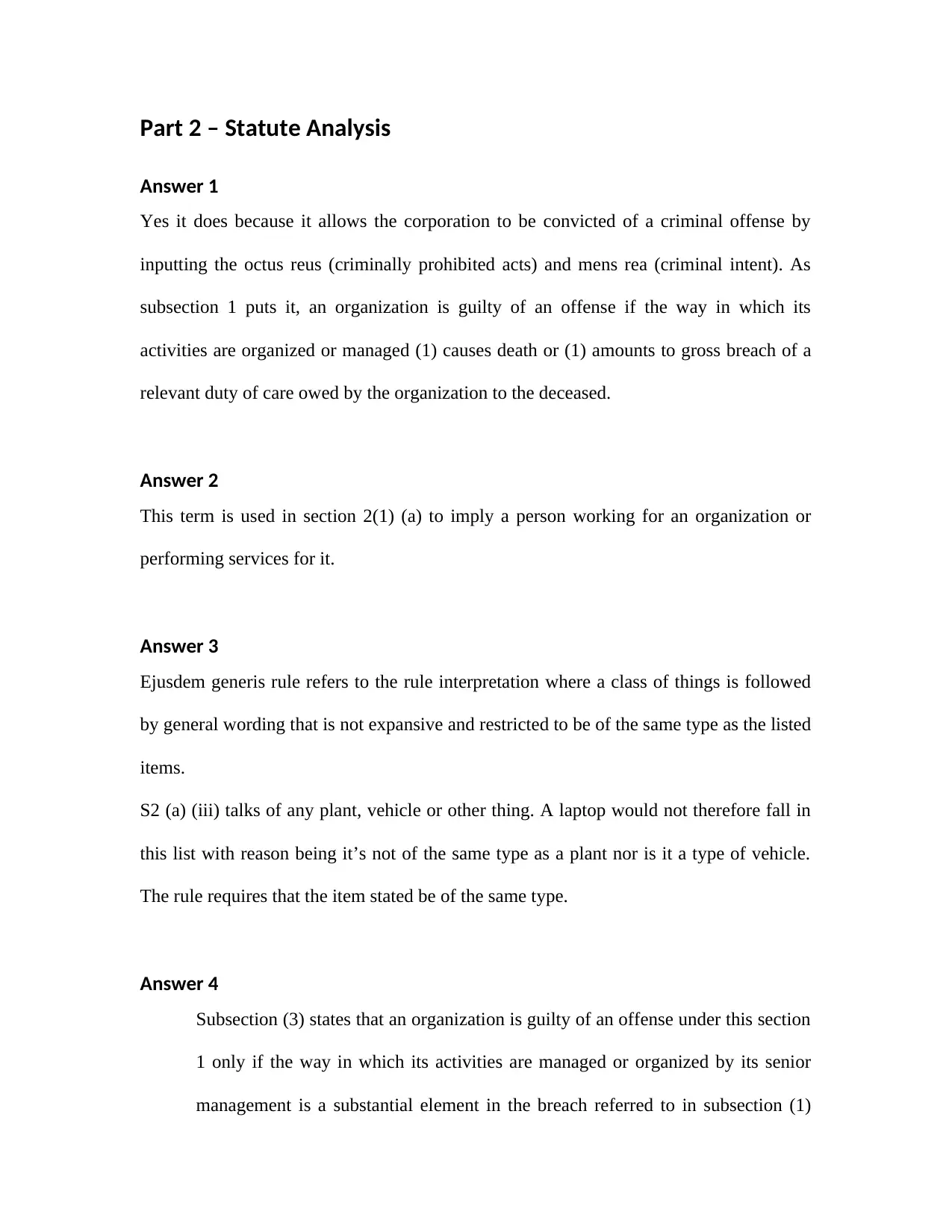
Part 2 – Statute Analysis
Answer 1
Yes it does because it allows the corporation to be convicted of a criminal offense by
inputting the octus reus (criminally prohibited acts) and mens rea (criminal intent). As
subsection 1 puts it, an organization is guilty of an offense if the way in which its
activities are organized or managed (1) causes death or (1) amounts to gross breach of a
relevant duty of care owed by the organization to the deceased.
Answer 2
This term is used in section 2(1) (a) to imply a person working for an organization or
performing services for it.
Answer 3
Ejusdem generis rule refers to the rule interpretation where a class of things is followed
by general wording that is not expansive and restricted to be of the same type as the listed
items.
S2 (a) (iii) talks of any plant, vehicle or other thing. A laptop would not therefore fall in
this list with reason being it’s not of the same type as a plant nor is it a type of vehicle.
The rule requires that the item stated be of the same type.
Answer 4
Subsection (3) states that an organization is guilty of an offense under this section
1 only if the way in which its activities are managed or organized by its senior
management is a substantial element in the breach referred to in subsection (1)
Answer 1
Yes it does because it allows the corporation to be convicted of a criminal offense by
inputting the octus reus (criminally prohibited acts) and mens rea (criminal intent). As
subsection 1 puts it, an organization is guilty of an offense if the way in which its
activities are organized or managed (1) causes death or (1) amounts to gross breach of a
relevant duty of care owed by the organization to the deceased.
Answer 2
This term is used in section 2(1) (a) to imply a person working for an organization or
performing services for it.
Answer 3
Ejusdem generis rule refers to the rule interpretation where a class of things is followed
by general wording that is not expansive and restricted to be of the same type as the listed
items.
S2 (a) (iii) talks of any plant, vehicle or other thing. A laptop would not therefore fall in
this list with reason being it’s not of the same type as a plant nor is it a type of vehicle.
The rule requires that the item stated be of the same type.
Answer 4
Subsection (3) states that an organization is guilty of an offense under this section
1 only if the way in which its activities are managed or organized by its senior
management is a substantial element in the breach referred to in subsection (1)
⊘ This is a preview!⊘
Do you want full access?
Subscribe today to unlock all pages.

Trusted by 1+ million students worldwide
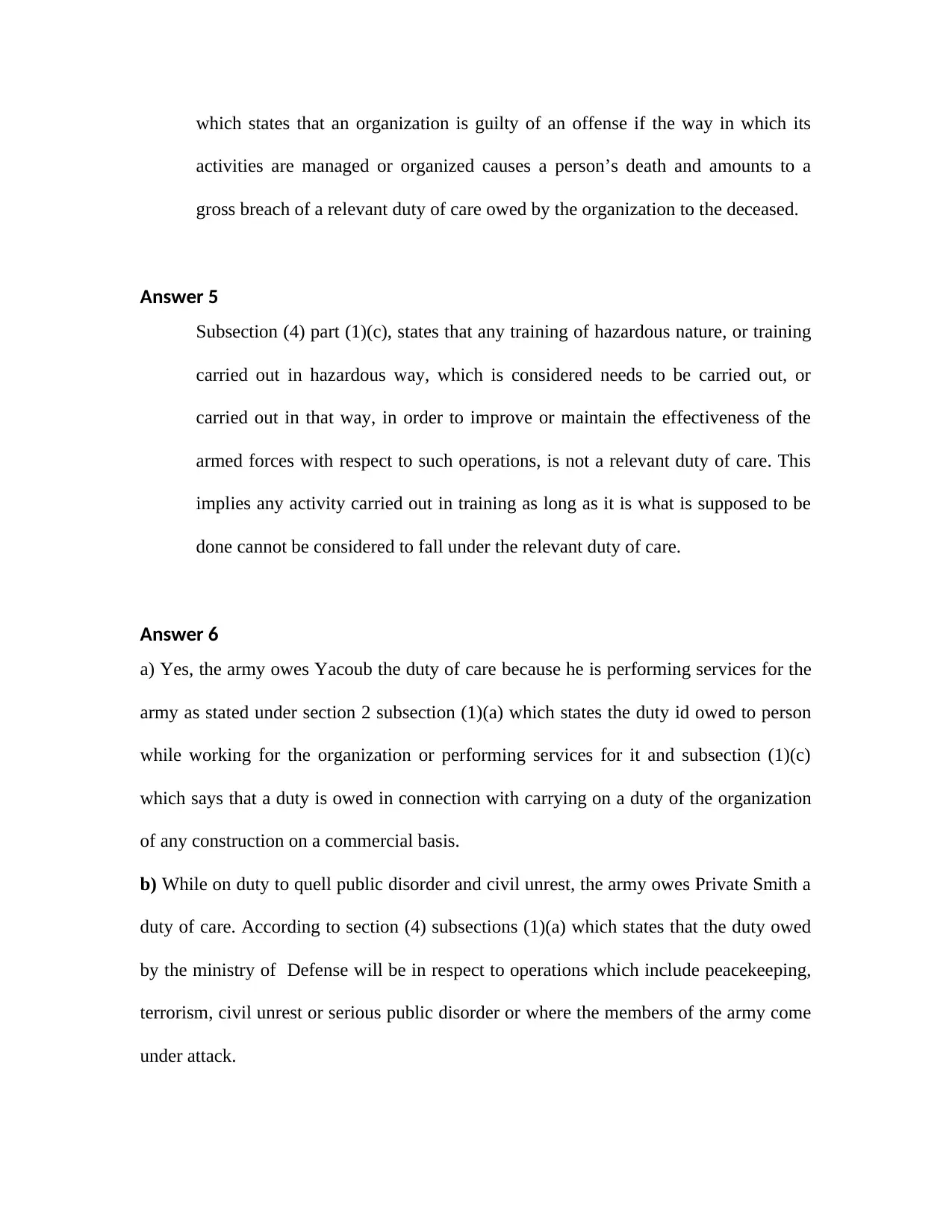
which states that an organization is guilty of an offense if the way in which its
activities are managed or organized causes a person’s death and amounts to a
gross breach of a relevant duty of care owed by the organization to the deceased.
Answer 5
Subsection (4) part (1)(c), states that any training of hazardous nature, or training
carried out in hazardous way, which is considered needs to be carried out, or
carried out in that way, in order to improve or maintain the effectiveness of the
armed forces with respect to such operations, is not a relevant duty of care. This
implies any activity carried out in training as long as it is what is supposed to be
done cannot be considered to fall under the relevant duty of care.
Answer 6
a) Yes, the army owes Yacoub the duty of care because he is performing services for the
army as stated under section 2 subsection (1)(a) which states the duty id owed to person
while working for the organization or performing services for it and subsection (1)(c)
which says that a duty is owed in connection with carrying on a duty of the organization
of any construction on a commercial basis.
b) While on duty to quell public disorder and civil unrest, the army owes Private Smith a
duty of care. According to section (4) subsections (1)(a) which states that the duty owed
by the ministry of Defense will be in respect to operations which include peacekeeping,
terrorism, civil unrest or serious public disorder or where the members of the army come
under attack.
activities are managed or organized causes a person’s death and amounts to a
gross breach of a relevant duty of care owed by the organization to the deceased.
Answer 5
Subsection (4) part (1)(c), states that any training of hazardous nature, or training
carried out in hazardous way, which is considered needs to be carried out, or
carried out in that way, in order to improve or maintain the effectiveness of the
armed forces with respect to such operations, is not a relevant duty of care. This
implies any activity carried out in training as long as it is what is supposed to be
done cannot be considered to fall under the relevant duty of care.
Answer 6
a) Yes, the army owes Yacoub the duty of care because he is performing services for the
army as stated under section 2 subsection (1)(a) which states the duty id owed to person
while working for the organization or performing services for it and subsection (1)(c)
which says that a duty is owed in connection with carrying on a duty of the organization
of any construction on a commercial basis.
b) While on duty to quell public disorder and civil unrest, the army owes Private Smith a
duty of care. According to section (4) subsections (1)(a) which states that the duty owed
by the ministry of Defense will be in respect to operations which include peacekeeping,
terrorism, civil unrest or serious public disorder or where the members of the army come
under attack.
Paraphrase This Document
Need a fresh take? Get an instant paraphrase of this document with our AI Paraphraser
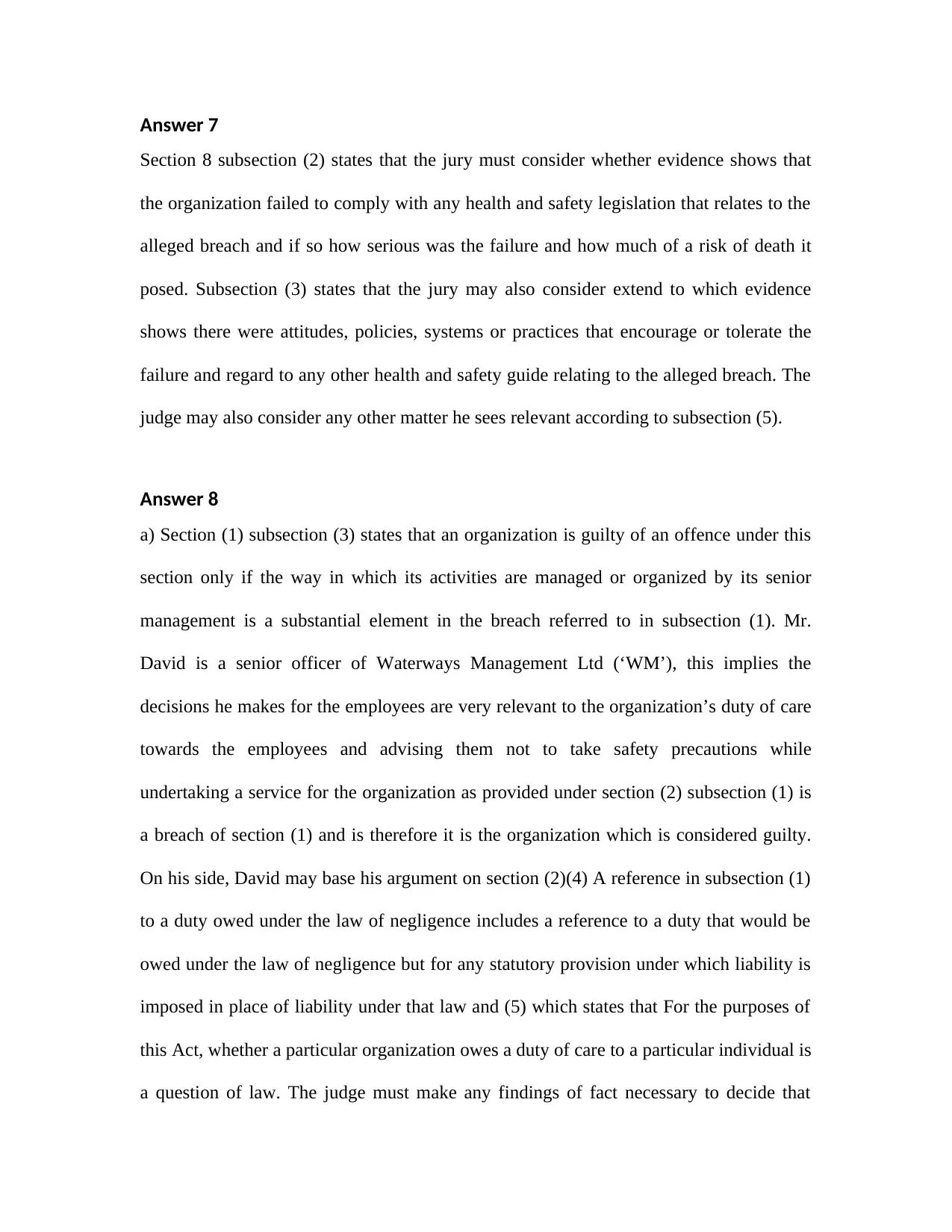
Answer 7
Section 8 subsection (2) states that the jury must consider whether evidence shows that
the organization failed to comply with any health and safety legislation that relates to the
alleged breach and if so how serious was the failure and how much of a risk of death it
posed. Subsection (3) states that the jury may also consider extend to which evidence
shows there were attitudes, policies, systems or practices that encourage or tolerate the
failure and regard to any other health and safety guide relating to the alleged breach. The
judge may also consider any other matter he sees relevant according to subsection (5).
Answer 8
a) Section (1) subsection (3) states that an organization is guilty of an offence under this
section only if the way in which its activities are managed or organized by its senior
management is a substantial element in the breach referred to in subsection (1). Mr.
David is a senior officer of Waterways Management Ltd (‘WM’), this implies the
decisions he makes for the employees are very relevant to the organization’s duty of care
towards the employees and advising them not to take safety precautions while
undertaking a service for the organization as provided under section (2) subsection (1) is
a breach of section (1) and is therefore it is the organization which is considered guilty.
On his side, David may base his argument on section (2)(4) A reference in subsection (1)
to a duty owed under the law of negligence includes a reference to a duty that would be
owed under the law of negligence but for any statutory provision under which liability is
imposed in place of liability under that law and (5) which states that For the purposes of
this Act, whether a particular organization owes a duty of care to a particular individual is
a question of law. The judge must make any findings of fact necessary to decide that
Section 8 subsection (2) states that the jury must consider whether evidence shows that
the organization failed to comply with any health and safety legislation that relates to the
alleged breach and if so how serious was the failure and how much of a risk of death it
posed. Subsection (3) states that the jury may also consider extend to which evidence
shows there were attitudes, policies, systems or practices that encourage or tolerate the
failure and regard to any other health and safety guide relating to the alleged breach. The
judge may also consider any other matter he sees relevant according to subsection (5).
Answer 8
a) Section (1) subsection (3) states that an organization is guilty of an offence under this
section only if the way in which its activities are managed or organized by its senior
management is a substantial element in the breach referred to in subsection (1). Mr.
David is a senior officer of Waterways Management Ltd (‘WM’), this implies the
decisions he makes for the employees are very relevant to the organization’s duty of care
towards the employees and advising them not to take safety precautions while
undertaking a service for the organization as provided under section (2) subsection (1) is
a breach of section (1) and is therefore it is the organization which is considered guilty.
On his side, David may base his argument on section (2)(4) A reference in subsection (1)
to a duty owed under the law of negligence includes a reference to a duty that would be
owed under the law of negligence but for any statutory provision under which liability is
imposed in place of liability under that law and (5) which states that For the purposes of
this Act, whether a particular organization owes a duty of care to a particular individual is
a question of law. The judge must make any findings of fact necessary to decide that
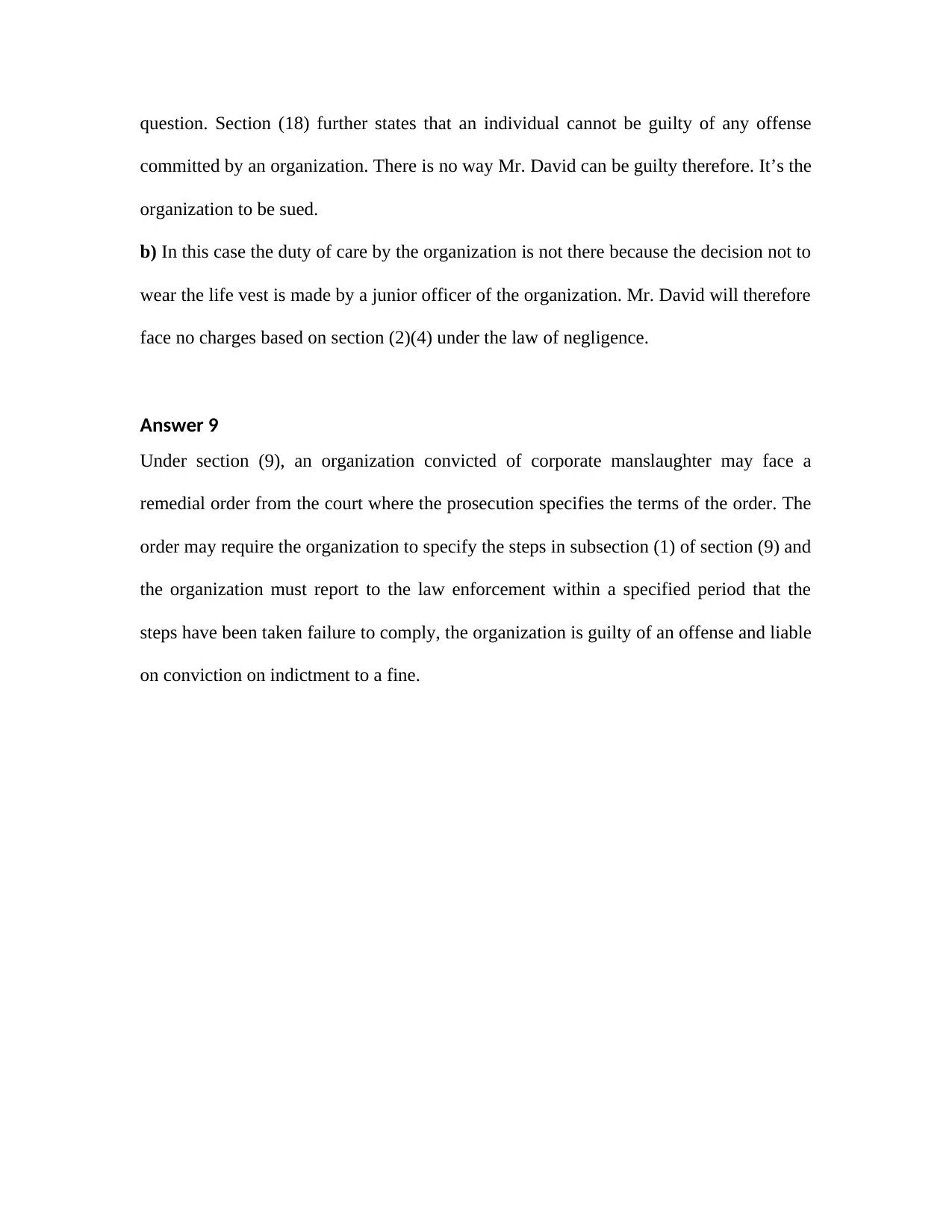
question. Section (18) further states that an individual cannot be guilty of any offense
committed by an organization. There is no way Mr. David can be guilty therefore. It’s the
organization to be sued.
b) In this case the duty of care by the organization is not there because the decision not to
wear the life vest is made by a junior officer of the organization. Mr. David will therefore
face no charges based on section (2)(4) under the law of negligence.
Answer 9
Under section (9), an organization convicted of corporate manslaughter may face a
remedial order from the court where the prosecution specifies the terms of the order. The
order may require the organization to specify the steps in subsection (1) of section (9) and
the organization must report to the law enforcement within a specified period that the
steps have been taken failure to comply, the organization is guilty of an offense and liable
on conviction on indictment to a fine.
committed by an organization. There is no way Mr. David can be guilty therefore. It’s the
organization to be sued.
b) In this case the duty of care by the organization is not there because the decision not to
wear the life vest is made by a junior officer of the organization. Mr. David will therefore
face no charges based on section (2)(4) under the law of negligence.
Answer 9
Under section (9), an organization convicted of corporate manslaughter may face a
remedial order from the court where the prosecution specifies the terms of the order. The
order may require the organization to specify the steps in subsection (1) of section (9) and
the organization must report to the law enforcement within a specified period that the
steps have been taken failure to comply, the organization is guilty of an offense and liable
on conviction on indictment to a fine.
⊘ This is a preview!⊘
Do you want full access?
Subscribe today to unlock all pages.

Trusted by 1+ million students worldwide
1 out of 13
Your All-in-One AI-Powered Toolkit for Academic Success.
+13062052269
info@desklib.com
Available 24*7 on WhatsApp / Email
![[object Object]](/_next/static/media/star-bottom.7253800d.svg)
Unlock your academic potential
Copyright © 2020–2026 A2Z Services. All Rights Reserved. Developed and managed by ZUCOL.

